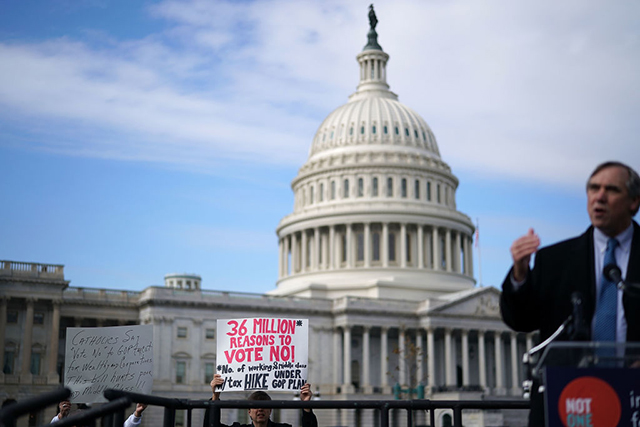
When it comes to tax cuts, congressional Republicans are determined to come through for their wealthy donors, and they don’t really care who gets hurt in the process. They want big tax cuts for corporations, rich people who can arrange to have their money come through a pass-through business, and the heirs of the super-wealthy. Everything else is just window dressing, or more accurately, window breaking.
Starting with the House bill, one measure, portrayed as closing a loophole, would end the medical care deduction. The medical care deduction only affects people who spend 10 percent of their income on medical bills.
The people in this situation are typically facing serious medical problems, like cancer or who have children with severe birth defects. The logic of giving the deduction is that if a middle-class family spends $40,000 on health care, they aren’t going to have the money to pay their taxes. Medical expenses are already the leading cause of bankruptcy in the country; the Republican tax plan should increase its lead.
Senate Republicans decided to leave the medical expense deduction in place, because they wanted to play their own game with people’s health. They propose removing the Obamacare mandate that requires people to buy insurance. According to the Congressional Budget Office (CBO), 13 million people will lose their health insurance within a decade.
Over time, the Republican plan will lead to the unraveling of the individual insurance market. As fewer healthy people sign up for insurance, the remaining pool will become ever less healthy. As a result, insurance in the individual market will become prohibitively expensive.
But this is just the start of the fun. Both the House and Senate bills propose raising the child tax credit from the current $1,000 to $1,650 per child. This is a good policy, except it’s not fully refundable. As a result, the people who need it most get little or nothing.
A single mother with two kids, earning $14,500 a year, can look forward to a whopping $75 a year from this tax credit. A couple with two kids earning $24,000 will get $200. By contrast, a couple with two kids earning $1 million will pocket $3,300 a year.
Then we have the Republican’s war on college education. Both bills eliminate the tax deductibility of interest on student loans. They also tax the tuition waivers that many grad students get as part of their payment as research or teaching assistants. The value of these waivers can easily be $20,000 or $30,000 a year.
Paying tax on this money will be a considerable burden on graduate students whose pay is often considerably less than the size of the tuition waiver. These are great policies if you think that too many low- and middle-income kids are going to college.
Then we have the elimination of the tax deduction for state and local income taxes. This is an effort to teach states like California and New York not to vote Democratic or spend money to help lower-income people.
There might be an argument for this pain if it served some important public purpose, but giving more money to the big winners in the economy for the last four decades doesn’t fit the bill. According to the Tax Policy Center, the richest 1 percent will get just under half of the tax cut over the next decade.
The Trump administration assures us that ordinary workers will still come out ahead because their corporate tax cuts will lead to a huge surge of investment. There is pretty much zero reason to believe this.
As Paul O’Neill, a former top executive at several major companies and Bush administration Treasury secretary, said: “As a businessman I never made an investment decision based on the tax code. If you give money away I will take it, but good business people don’t do things because of inducements.”
Perhaps the biggest irony in this story is that the economy is actually doing pretty well right now. Unemployment is at its lowest level since 2000, wages are increasing up and down the income ladder, and we may actually be seeing the beginning of a pickup in productivity growth.
It’s hard to see the rationale for the Republican tax cut plan in this picture, even if we accepted their story. But, as the saying goes, #RichPeopleNeedTaxCuts.
Our most important fundraising appeal of the year
December is the most critical time of year for Truthout, because our nonprofit news is funded almost entirely by individual donations from readers like you. So before you navigate away, we ask that you take just a second to support Truthout with a tax-deductible donation.
This year is a little different. We are up against a far-reaching, wide-scale attack on press freedom coming from the Trump administration. 2025 was a year of frightening censorship, news industry corporate consolidation, and worsening financial conditions for progressive nonprofits across the board.
We can only resist Trump’s agenda by cultivating a strong base of support. The right-wing mediasphere is funded comfortably by billionaire owners and venture capitalist philanthropists. At Truthout, we have you.
We’ve set an ambitious target for our year-end campaign — a goal of $211,000 to keep up our fight against authoritarianism in 2026. Please take a meaningful action in this fight: make a one-time or monthly donation to Truthout before December 31. If you have the means, please dig deep.